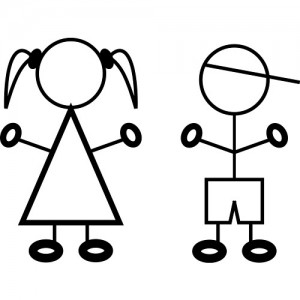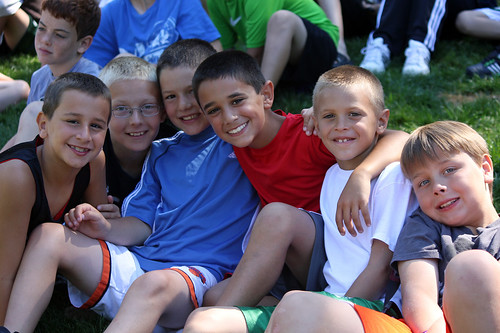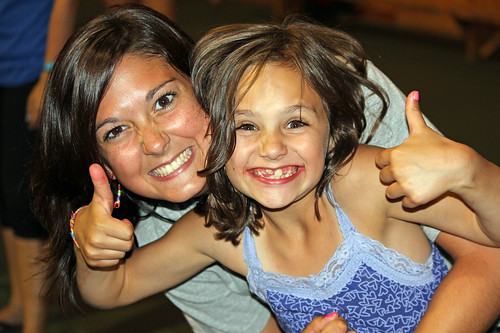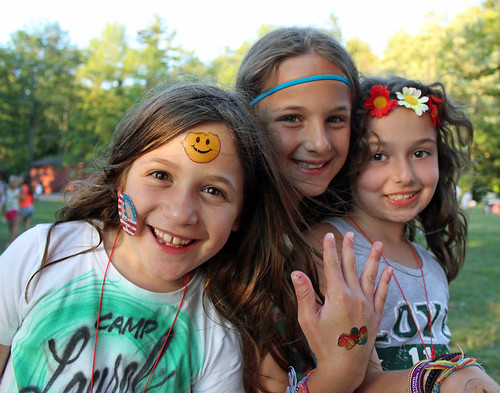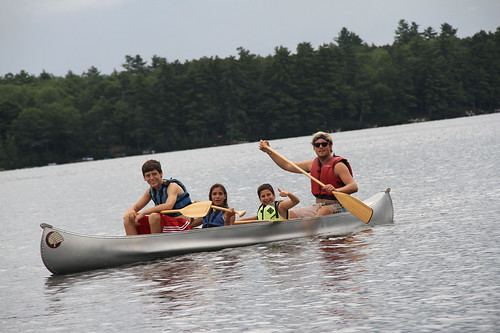 The holidays are upon us and ‘tis the season to ponder those things for which we’re truly thankful. For those of us who are fortunate enough to eat, sleep and breathe camp 24/7, 365 days a year, it’s hard not to make an exclusive “Camp Laurel” list. After all, camp is just as much a part of our lives in November as it is in June. So we figured we’d share some camp things for which we are thankful all year long.
The holidays are upon us and ‘tis the season to ponder those things for which we’re truly thankful. For those of us who are fortunate enough to eat, sleep and breathe camp 24/7, 365 days a year, it’s hard not to make an exclusive “Camp Laurel” list. After all, camp is just as much a part of our lives in November as it is in June. So we figured we’d share some camp things for which we are thankful all year long.
1.) Our campers. Each and every one of our campers brings something unique to camp that makes our camp family complete. Getting emails and phone calls about our campers’ accomplishments throughout the winter makes the memories we have of the summer that much more special, and makes us even more excited to see everyone the following year.
2.) Our camp parents. We feel pretty lucky to have so many parents who as enthusiastic about camp as their children and who keep in touch throughout the winter, providing us with fun and interesting updates.
touch throughout the winter, providing us with fun and interesting updates.
3.) Our staff. Finding a staff of talented people who are willing to leave their first homes and make summer camp their second home for several weeks each summer in order to literally live their jobs day and night is no easy feat. That we’re able to put together a staff each summer who is so vested in creating an amazing summer for all of our campers is truly a blessing.
4.) Alumni. It’s always a special treat when our alumni share their favorite camp memories and reiterate how great their camp years were. The fact that so many of our alumni are still in touch and/or are active within our community says a lot to us about just how special camp is and motivates us to continue to strive to make camp a lifetime worth of memories.
 5.) A beautiful campus. That first drive into camp each summer is always so special. No matter how many times we’ve been there, that first glance of the bunks/cabins, the dining hall, the fields, the courts and the waterfront each summer is something we anticipate all year long.
5.) A beautiful campus. That first drive into camp each summer is always so special. No matter how many times we’ve been there, that first glance of the bunks/cabins, the dining hall, the fields, the courts and the waterfront each summer is something we anticipate all year long.
 6.) Memories. Memories are what makes each summer different than the last. Even in the fall, we find ourselves asking each other, “Remember when…?” and laughing over our favorite camp moments throughout the year.
6.) Memories. Memories are what makes each summer different than the last. Even in the fall, we find ourselves asking each other, “Remember when…?” and laughing over our favorite camp moments throughout the year.
7.) Camp Songs. We often find ourselves turning up the volume whenever a song that proved popular the summer before plays on the radio or humming the alma mater or a favorite dining room tune while we’re busy planning for next summer.
8.) Camp friends. It’s so nice to have someone with whom we can remember those special moments from previous summers and with whom we can have a hearty laugh about those inside moments that only our camp friends can understand. It’s also nice to be able to re-experience camp through meetups through the winter and makes us even that much more excited about next summer.
9.) The camp tradition. It sounds pretty obvious, but just the fact that we’re able to carry on such a beloved tradition is a privilege. Summer camps have been around for more than a hundred years and such an iconic part of our culture that movies and television shows have been made about summer camp and books have been written about it. Not to mention, without summer camp, we’re not quite sure what we’d be doing. We certainly can’t imagine doing anything else.
10.) The promise of next summer. We’ve said it a million times, but we start anticipating the next summer as soon as the buses pull  away. That ten month wait each year seems like forever, but it proves to be just enough time to plan another summer that promises to be even better than the last. The anticipation drives us all year long as we plan and makes us thankful to be part of camp all year.
away. That ten month wait each year seems like forever, but it proves to be just enough time to plan another summer that promises to be even better than the last. The anticipation drives us all year long as we plan and makes us thankful to be part of camp all year.








 campers’ lives as they play in carrying on its traditions. There are a lot of camp articles that sing the praises of summer camp for young children, but few focus on the value of the camp experience for young teens. By the time many campers reach their teens, they already have several camp summers behind them. For them, it’s not really about newness anymore, but reliability and tradition: who is at camp, what is at camp, camp rites to which they’ve looked forward since they were young. In a period of child’s life that can be a roller coaster full of ups and downs that come at full speed, summer camp is oasis of stability. It’s solid ground, a safe place where teenagers go to be themselves and to let loose of the stress and strain that are inextricably part of the teenage years.
campers’ lives as they play in carrying on its traditions. There are a lot of camp articles that sing the praises of summer camp for young children, but few focus on the value of the camp experience for young teens. By the time many campers reach their teens, they already have several camp summers behind them. For them, it’s not really about newness anymore, but reliability and tradition: who is at camp, what is at camp, camp rites to which they’ve looked forward since they were young. In a period of child’s life that can be a roller coaster full of ups and downs that come at full speed, summer camp is oasis of stability. It’s solid ground, a safe place where teenagers go to be themselves and to let loose of the stress and strain that are inextricably part of the teenage years. At summer camp, teenagers can still be young while getting a taste of what it means to be grown up. They connect with a small group of people with whom they’ve shared experiences since they were very young and with whom they continue to share experiences. They not only share experiences, they share memories that only a select group of others shares. Both give older campers a distinct sense of belonging. Regardless of who or what they are to their school peers the other ten months of the year, camp is a circle of inclusion that often extends far beyond the camp years. Older campers also benefit from privileges that come from being older. They’re tapped to lead camp activities, given leadership roles on teams of younger campers, and charged with being examples in honoring camp traditions. In short, older campers “train” younger campers how to be good campers. For many of them, being a role model and a mentor is one of the best aspects of camp. The pride in having played a role in a younger camper’s life is what brings many former campers back to camp in their adult years to work as counselors.
At summer camp, teenagers can still be young while getting a taste of what it means to be grown up. They connect with a small group of people with whom they’ve shared experiences since they were very young and with whom they continue to share experiences. They not only share experiences, they share memories that only a select group of others shares. Both give older campers a distinct sense of belonging. Regardless of who or what they are to their school peers the other ten months of the year, camp is a circle of inclusion that often extends far beyond the camp years. Older campers also benefit from privileges that come from being older. They’re tapped to lead camp activities, given leadership roles on teams of younger campers, and charged with being examples in honoring camp traditions. In short, older campers “train” younger campers how to be good campers. For many of them, being a role model and a mentor is one of the best aspects of camp. The pride in having played a role in a younger camper’s life is what brings many former campers back to camp in their adult years to work as counselors. sample career life through Apprentice type tasks, giving them the opportunity to write an essay for the camp blog, giving them a camera and letting them take photos for the camp website, helping them write a college essay or work through a summer reading assignment, or just talking to them about what life as a teacher or a coach is like. By the time campers reach their teenage years, they’ve learned to appreciate what staff members bring to the table and are eager to learn and listen. Ask any former camper to name a camp staff member who had a special impact on their lives, and within seconds they’ll share the story of a beloved counselor or staff member who taught them something about life that they still practice today.
sample career life through Apprentice type tasks, giving them the opportunity to write an essay for the camp blog, giving them a camera and letting them take photos for the camp website, helping them write a college essay or work through a summer reading assignment, or just talking to them about what life as a teacher or a coach is like. By the time campers reach their teenage years, they’ve learned to appreciate what staff members bring to the table and are eager to learn and listen. Ask any former camper to name a camp staff member who had a special impact on their lives, and within seconds they’ll share the story of a beloved counselor or staff member who taught them something about life that they still practice today. Although many bonds form when campers are young, some of the most special form when they’re older. Sometimes something as simple as a team building exercise helps teenage campers realize that they have more in common with a fellow camper than they thought they did. At an age when it’s all too easy to feel isolated, being able everyday to realize life as a valuable part of a whole translates into some of the most special memories of a camp career.
Although many bonds form when campers are young, some of the most special form when they’re older. Sometimes something as simple as a team building exercise helps teenage campers realize that they have more in common with a fellow camper than they thought they did. At an age when it’s all too easy to feel isolated, being able everyday to realize life as a valuable part of a whole translates into some of the most special memories of a camp career.